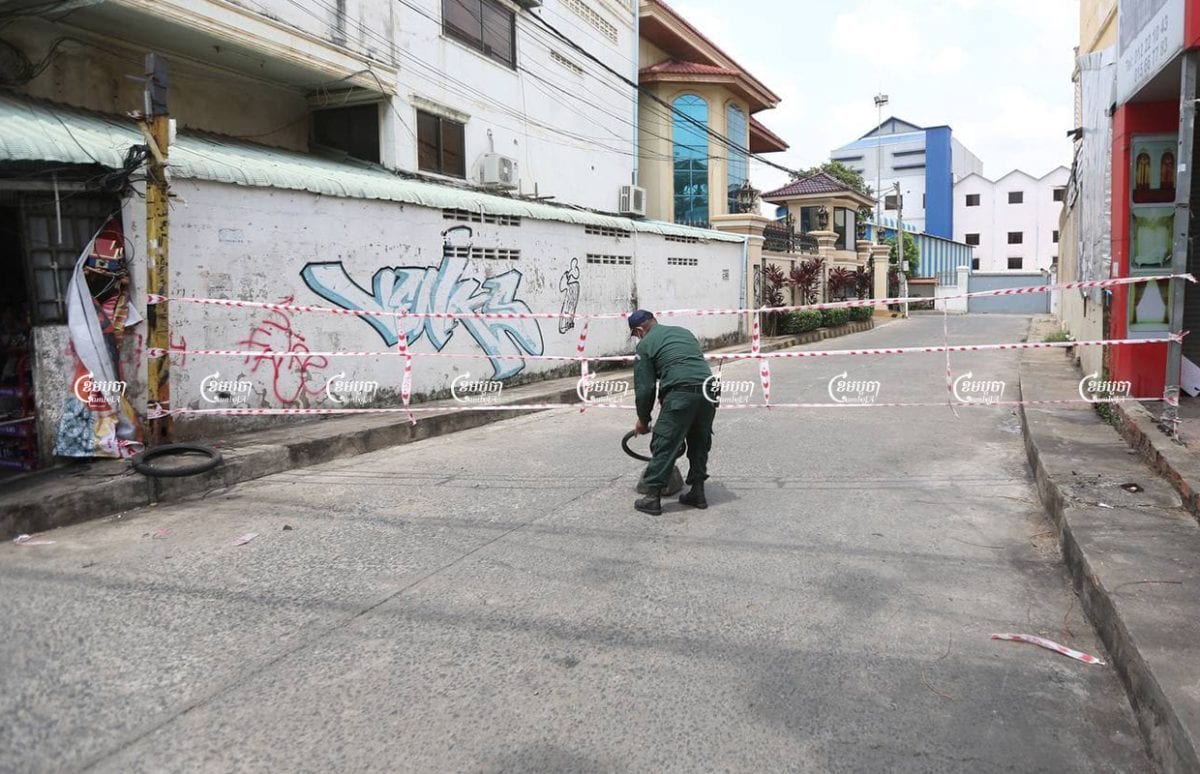One day after Press Freedom Day, the Information Ministry on Tuesday issued a letter to journalists warning them that violations of COVID-19 measures could result in legal actions. Though the statement made no mention of specific cases, it came a day after a Facebook livestream showing COVID-19 patients and ambulances waiting for hours to enter a government treatment center went viral.
“To keep the safety of society and to prevent the spread of COVID-19 in the community, the Ministry of Information would like to suggest to stop all activities stated above. In case the violation of this announcement, [you] will be responsible according to the existing law”, read the announcement.
On Monday night, several Facebook news outlets posted a livestream filmed by a driver outside Olympic Stadium. In it, the streamer talks to COVID-19 patients and ambulance drivers who say they had been waiting for hours to enter the mass treatment site. The video quickly amassed tens of thousands of views.
Information Ministry spokesman Meas Sophorn said the ministry will take legal action against any journalists who have violated COVID-19 guidelines.
“We have seen some journalists have disseminated information in prohibited areas as red zones or medical treatment areas of COVID-19, including chasing ambulances,” he said, adding that “those activities… provoke turmoil in society.”
“The Information Ministry considers that those activities are being carried against the law and any measures [of the Health Ministry], and those activities do not follow ethical journalism,” Sophorn said.
“It is not violating the rights of press freedom if they have followed the law,” he said, adding that additional restrictions on media during the pandemic are aimed only at curbing the spread of COVID-19.
Phnom Penh and Takhmao city have been locked down since April 15, with various restrictions on movement — including that of journalists. Reporters are allowed to move freely only after receiving special permission letters from the Ministry of Information. But even with those letters, journalists are barred from entering red zones without additional permission from local authorities. When a new law to prevent the spread of COVID-19 was passed in March, rights activists warned that the vague language could be used to go after anyone the government viewed as a critic. Last year, a journalist spent six months in prison after posting a quote from a speech by Prime Minister Hun Sen related to COVID-19 that the court said was used out of context for incitement.
On World Press Freedom Day, a number of civil society groups and media associations said Cambodia was facing a worsening media environment as a result of an ongoing government
crackdowns on independent media, including threats, violence and the imprisonment of journalists. A spokesperson for the Ministry of Information rejected the allegation, insisting that the nation’s press continued to operate freely and smoothly. Reporters Without Borders ranked Cambodia 144th out of 180 countries in the 2021 World Press Freedom Index, and it has been steadily dropping since 2017.
Nop Vy, executive director of the Cambodian Journalists Alliance Association, expressed concern that freedom of the press remains under threat, especially during the pandemic.
“I think [the Ministry of Information] has seemingly threatened to take legal action against journalists,” he said, adding that journalists should not be threatened or face legal action, but that they do need to adhere to a level of professionalism.
“It is a warning message to journalists,” Vy said.
He said the government is likely particularly unhappy with livestreams, which can offer unedited eyewitness footage of negative situations the government would rather not be seen by the public.
Ith Sothoeuth, media director at the Cambodian Center for Independent Media, echoed Vy, saying that independent journalists play an important role in democratic society.
“Yes, it is a restriction [of press freedom] because they are not allowed the right to do professional journalism and they ban them from reporting that event,” Sothoeuth said.
“So it affects the right to access to information,” he said.
Reporting on negative situations, he added, can help the government to be aware of problems and improve its governance.
On Tuesday, the Health Ministry announced there had been 938 new cases of COVID-19, including 608 cases in Phnom Penh, 175 cases in Kandal, 77 cases in Preah Sihanouk, 51 cases in Banteay Meanchey, and the rest in Kampong Speu, Takeo, Prey Veng, Tbong Khmum, Svay Rieng, Battambang, and Pursat.
As of Tuessay 107 people have died of COVID-19 — all from the latest outbreak. Health officials have recorded 15,744new infections since the February 20 community event, with a total overall case count of 16,299 cases since the start of the pandemic in early 2020.








